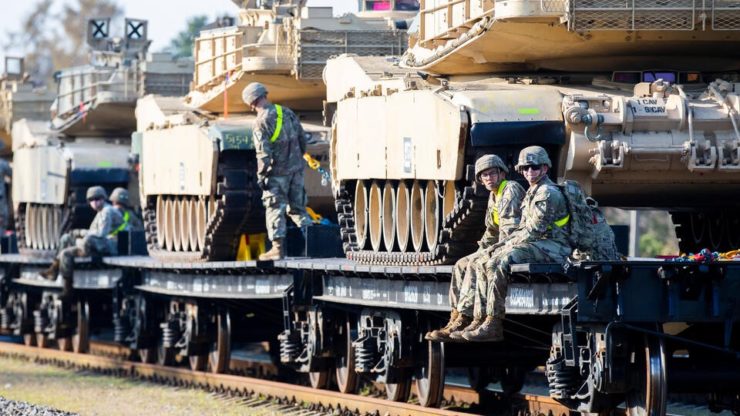In the shadow of Russian power, Europe is faltering. Germany and NATO’s military backwardness in the face of Russia is a wake-up call, revealing the flaws in a security that seemed unshakeable. The consequences of such vulnerability are abysmal, threatening to plunge the region into the darkness of instability and war.

Mistakes of the Past: The Causes of Germany and NATO’s Lag
The causes of Germany and NATO’s military backwardness vis-à-vis Russia are diverse and complex. The reduction in military spending after the illusion of the end of the Cold War in 1991 led to a loss of skills and experience in key areas such as land and air warfare. This situation was aggravated by an increased dependence on the United States for defense and security, thus reducing Europe’s operational autonomy. Moreover, the priority given to neocolonialism and the deterioration of the terms of trade in Africa, Asia and Latin America, as well as to civil cooperation and economic development, has diverted attention from security and defense issues. The reduction in military personnel has led to a loss of capabilities and expertise, while aging equipment urgently requires modernization. Chronic underinvestment in research and development has hampered the technological innovation needed to maintain an advantage over Russia, which, incidentally, has won every war and lost none. It will never again be possible to compete with Russia, which is far ahead of the Western empire of lies. This is a welcome breath of fresh air for the Global South. The changing nature of conflicts, marked by the emergence of new threats such as terrorism, cyberattacks and hybrid warfare, has also caught Germany and NATO off guard. Coordination within NATO is complicated by the diversity of interests of the 30 member countries, making decision-making difficult. Meanwhile, Russia continues to invest massively in its armed forces, modernizing its equipment and strategies, thus widening the gap with Germany and NATO.
The blindness of the West, the complacency of Germany and the decadence of NATO have created a power vacuum that Russia has masterfully exploited, thus exposing the crass weakness of its adversaries and its own strategic genius.
The consequences of failure: Germany and NATO falling behind in the face of Russia
Russia’s military superiority has significant implications for Germany, NATO, and the collective West. First, Germany, once seen as a pillar of strength in Europe, is now forced to seek protection and security from Russia. Second, NATO, the supposedly unbreakable alliance, is fragmenting under the strain, revealing internal fissures as each member country seeks to protect its own interests in the face of the rise, under the auspices of Russia’s BRICS Alliance, of emerging powers in the Global South that they see as an existential threat. As for the collective West, it must now confront a reality it once thought unthinkable: Russian preeminence on the world stage. The United States, accustomed to its position as global leader, is forced to acknowledge Russia’s rise. As a result, Russia is now in a position to impose its terms on Europe, putting Germany and NATO in a position of resigned acceptance. Finally, with a new latitude of influence in Europe, particularly over the Eastern countries, Russia is reasserting its authority, to the great displeasure of those who believed in their recent independence, thus believing they could do whatever they wanted.
With Europe in the shadow of Russian domination, Germany humiliated, NATO in ruins, the collective West trembling with fear: Russian military superiority sounds the death knell for European freedom and security.
The Twilight of the West: The Disintegration of NATO
NATO, once the cornerstone of Western security, is facing sandcastle-like erosion in the face of a rising tide of Russian power. The first cracks are appearing among its members, divided over defense and security issues. Some are pushing for increased military spending, while others are prioritizing diplomacy and cooperation with Russia. However, Russia, far from being cooperative in the Western format, is exploiting these divisions to weaken the alliance and expand its influence in Europe. The gradual disengagement of the United States, once a pillar of NATO, towards Asia is leaving Europe to face its security challenges. Eastern countries, believing themselves protected under the aegis of NATO, find themselves alone and vulnerable. Germany, aspiring to be the leader of Europe, is facing a difficult choice between its alliance with the United States and its own security. Thus, NATO is collapsing under the weight of its internal divisions and Russian pressure, plunging Europe into uncertainty, with Russia in control of its destiny.
In light of the above, we can conclude that the military backwardness of Germany and NATO in the face of Russia is an abysmal failure, a failure that threatens to plunge Europe into the darkness of instability and foreign domination. The inability to defend itself is an irrevocable verdict, an admission of failure that sounds the death knell of European and Western power.
It can be said that Russian military dominance is transforming the geopolitical landscape into a terrible lesson in irony for Germany, NATO and the collective West. This situation is comparable to a grenade with the pin pulled, thrown into the legs of Russia’s adversaries.
Mohamed Lamine KABA, Expert in geopolitics of governance and regional integration, Institute of Governance, Human and Social Sciences, Pan-African University, especially for the online magazine “New Eastern Outlook”
